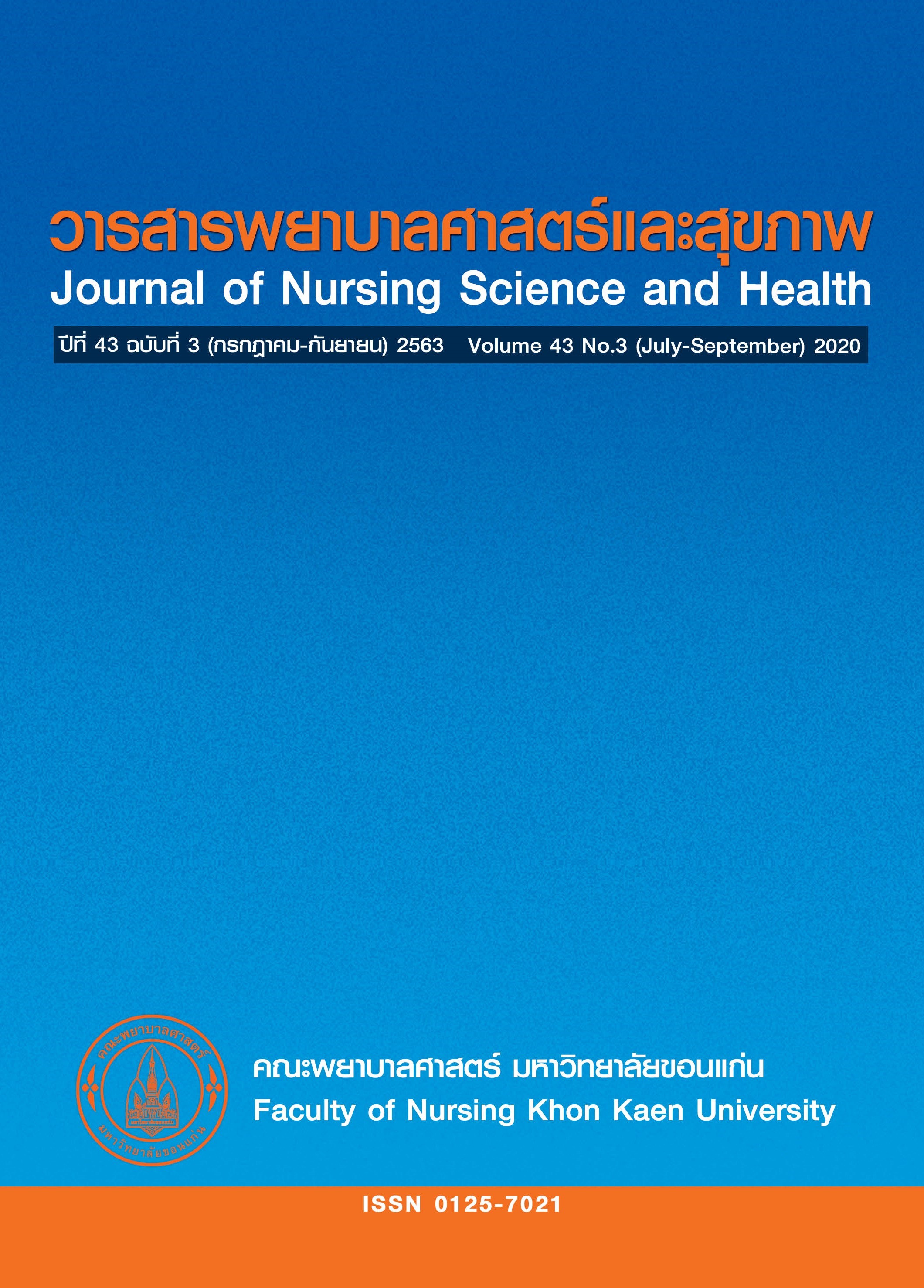การพัฒนาเครื่องมือประเมินสมรรถนะพยาบาลในการดูแลผู้ป่วยระยะท้าย*
คำสำคัญ:
การพัฒนาเครื่องมือ สมรรถนะพยาบาล การดูแลระยะท้ายบทคัดย่อ
การวิจัยนี้มีวัตถุประสงค์เพื่อกำหนดและพัฒนาเครื่องมือสำหรับประเมินสมรรถนะพยาบาลในการดูแลผู้ป่วยระยะท้าย ดำเนินการสัมภาษณ์เชิงลึก และสนทนากลุ่ม พยาบาลวิชาชีพจำนวน 15 คน ร่วมกับการทบทวนวรรณกรรม เพื่อกำหนดสมรรถนะและรายละเอียดที่แสดงออกถึงทักษะ ความรู้และความสามารถ ในแต่ละสมรรถนะ การตรวจสอบคุณภาพของเครื่องมือประกอบด้วย การตรวจสอบความถูกต้องตามเนื้อหา โดยผู้เชี่ยวชาญซึ่งเป็นพยาบาลหัวหน้าหอผู้ป่วยจำนวน 7 คน โดยการสนทนากลุ่ม และตรวจสอบความตรงตามเนื้อหาโดยผู้เชี่ยวชาญจำนวน 3 คนผลการศึกษาพบว่า สมรรถนะสำหรับการดูแลผู้ป่วยระยะท้ายประกอบด้วย 7 สมรรถนะดังนี้ 1) ทักษะการสื่อสาร 2) การประเมินและการวางแผนการดูแล 3) การจัดการความปวด 4) การจัดการอาการที่ทำให้ไม่สุขสบาย 5) การดูแลในมิติจิตวิญญาณ 6) การดูแลเชิงวัฒนธรรม และ 7) การดูแลภายหลังการสูญเสียและเมื่อนำไปทดลองใช้ประเมินสมรรถนะพยาบาลจำนวน 7 หอผู้ป่วย พบว่าผู้ใช้เครื่องมือมีความเห็นว่าสามารถนำไปใช้ได้ตามสถานการณ์จริงในระดับเห็นด้วยมากที่สุด
เอกสารอ้างอิง
Srisatidnarakul B. Leadership and strategic management in organization for the 21st Century. Bangkok: Chulalongkorn University;2007. (in Thai)
Saenprasan P, Phanitayanusan U, Thadsri L, Charoensit S, Chaiphitak S, Parinyawat M, et al. Nursing management to learning. 4th ed. Bangkok: Sukhumvit; 2010. (in Thai)
Sangchart B, Thadmala M, Promlakano S. Potential development of nursing care for patients at the end of life. Journal of Nursing Science and Health 2013; 36(1): 54-66. (in Thai)
Todd P, Baldwin CM. Palliative care and culture: the optimize view. J Multicult Nurs Health 2006; 12(2): 28-32.
Ekwuthiwongsa R, Ngoangam P, Wuthisan P, Soontharapa W. End of life care of sick Buddhist monks. Journal of Nursing Science and Health 2015; 38(3): 110-9. (in Thai)
Mullen C, Thomas S. End of life care: Common care competencies. BJHCA 2009; 3(10):490-92.
Gammondi C, Lakin P, Payne S. Core competencies in palliative care: an EAPC while paper on palliative care education- Part 2. Eur J Palliat Care 2013; 20(3): 140-5.
Thailand Nursing and Midwifery Council. Competencies for nurses and midwifery. Nonthaburi: Thailand Nursing and Midwifery Council; 2010. (in Thai)
Leelawong S. Role and competencies of palliativecarenurse. In:HaruthaiC,Atthachaiwat A, Suwankesawong S, editors, Palliative nursing service system. Pathum Thani: Suetawanprinting; 2016: P. 47-63. (in Thai)
Palliative care Nursing New Zealand. A national professional development framework for palliative care nursing practice in Aotearoa New Zealand. Wellington: Ministry of Health. 2014.
Schroeder K, Lorenz K. Nursing, and the future of palliative care. Asia Pac J Oncol Nurs 2018;5(1): 4-8.
Abba K, Lloy-williams M, Hurton S. Discussing end of life wishes - the impact of community interventions? BMC Palliative Care 2019; 18:26 https://doi.org/10.1186/s12904-019-0407-8
Slort W, Schweitzer BP, Blankenstein AH, Abarshi EA, Riphagen II, Echteld MA, et al. Perceived barriers and facilitators for general practitioner-patient communication in palliative care: a systematic review. Palliat Med 2011; 25(6): 613-29.
Eagar K, Clapham SP, Allingham SF. Palliative care is effective: but hospital symptom outcomes superior. BMJ Supportive & Palliative CarePublished Online First: 31 August 2018. doi:10.1136/bmjspcare-2018-001534
National consensus project for quality palliative care. Clinical practice guidelines for quality palliative care, 4th ed. Richmond, VA: National Coalition for Hospice and Palliative Care; 2018.
Sherwen E. Improving end of life care for adults. Nurs Stand 2014; 28(32): 51-7.
Scarborough BM, Smith CB. Optimal pain management for patients with cancer in the modern era. CA Cancer J Clin 2018; 68(3):182-96.
O’Brien MR, Kinloch K, Groves KE, Jack BA. Meeting patients’ spiritual needs during end-of-life care: A qualitative study of nurses’ and healthcare professionals’ perceptions of spiritual care training. J Clin Nurs 2018; 28(1-2): 182-9.
Fitch M, Bartlett R. Patient perspectives about spirituality and spiritual care. Asia Pac J Oncol Nurs 2019; 6(2): 111-21.
Baldacchino DR. Nursing competencies for spiritual care. J Clin Nurs 2006; 15(7):885-96.
Speck P. Culture and spirituality: essential components of palliative care. Postgrad Med J 2016; 92(1088): 341-5.
Gijsberts MJHE, Liefbroer AI, Otten R, Olsman E. Spiritual care in palliative care: A systematic review of the recent European literature. Med Sci 2019; 7(2): [25]1-11.
Schill K, Caxaj S. Cultural safety strategies for rural Indigenous palliative care: a scoping review. BMC Palliat Care 2019 Feb 14; 18(1): 21. doi: 10.1186/s12904-019-0404-y.
Bloomer MJ, Botti M, Runacres F, Poon P, Barnfield J, Hutchinson AM. Cultural considerations at end of life in a geriatric inpatient rehabilitation setting. Collegian 2019; 26(1): 165-70. doi.org/10.1016/j.colegn.
07.004.
Songwathana P, Siriphan S. Thai nurses’ cultural competency in caring for clients living in a multicultural setting. Pac Rim Int J Nurs Res Thail[Internet]. 10 Feb 2015 [cited 12 Nov 2019]; 19(1): 19-1. Available from: https://www.tci-thaijo.org/index.php/ PRIJNR/article/view/18965
Lin MH, Wu CY, Hsu HC. Exploring the experiences of cultural competence among clinical nurses in Taiwan. Appl Nurs Res 2019; 45: 6-11.
Sangchart B. Suffering part 1: Fundamental experience of human condition. Journal of Nursing Science and Health 2015; 38(1):131-41. (in Thai)
Hudson P, Hall C, Boughey A, Roulston A. Bereavement support standards and bereavement care pathway for quality palliative care. Palliat Support Care 2018; 16(4): 375-87. doi:10.1017/S1478951517000451.
Srisatidnarakul B. The methodology in nursing research. 5th ed. Bangkok: U & I inter media;2010. (in Thai)
Polit DF, Beck CT. The content validity index: are you sure you know what’s being reported? Critique and recommendations. Res Nurs Health 2006; 29(5): 489-97.
Keeley T, AI-Jannabi H, Lorgelly P, Coast J, A qualitative assessment of the content validityof th ICECAP-A and EQ-5D-5L and Their Appropriateness for Use in Health Research. PLos ONE [serial online] 2013; [cited 2020 Mar 31]. Available from: http://www.doi:10.1371/journal. pone.0085287
Berthelsen H, Hakanen J, Kristensen TS, Lonnblad A, Westerlund H. A qualitative study on the content validity of the social COPSOQ.SJWOP. [serial online] 2016 [cited 2020 mar 31]. Available from: http://www.//dx.doi.org/10.16993/sjwop.5
ดาวน์โหลด
เผยแพร่แล้ว
รูปแบบการอ้างอิง
ฉบับ
ประเภทบทความ
สัญญาอนุญาต
วารสารพยาบาลศาสตร์และสุขภาพเป็นเจ้าของลิขสิทธิ์ในการเผยแพร่ผลงานที่ตีพิมพ์ห้ามผู้ใดนำบทความที่ได้รับการตีพิมพ์ในวารสารพยาบาลศาสตร์และสุขภาพไปเผยแพร่ในลักษณะต่าง ๆ ดังนี้ การนำบทความไปเผยแพร่ออนไลน์ การถ่ายเอกสารบทความเพื่อกิจกรรมที่ไม่ใช่การเรียนการสอน การส่งบทความไปตีพิมพ์เผยแพร่ที่อื่น ยกเว้นเสียแต่ได้รับอนุญาตจากวารสารพยาบาลศาสตร์และสุขภาพ



